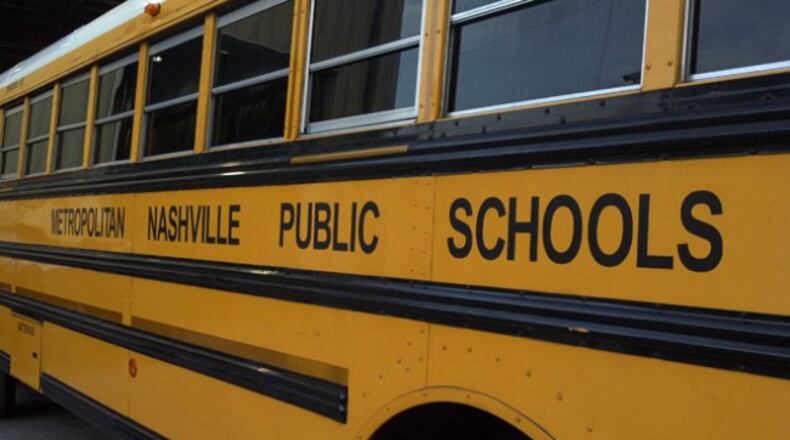Christiane Buggs and Will Pinkston are elected members of the local school board in Nashville, Tenn. In this piece, they urge Georgia voters to reject the Opportunity School District, which is modeled after Tennessee’s Achievement School District.
Georgia voters will be asked on Nov. 8 to approve a constitutional change -- Amendment 1 on the ballot -- to enable the state to assume control of local schools and the local taxes going to those schools.
First some background: Tennessee created the ASD to turn around chronically low-performing schools by taking control away from the local districts and putting most of the schools under the aegis of high quality charter management organizations. The school's new overseers were given an ambitious target: Boost their schools into the top 25 percent of performance within five years.
The approach is not working, in part because charter management organizations took over existing schools rather than starting fresh with new schools chosen by students and families. They underestimated the challenges and resistance.
The Tennessee Consortium on Research, Evaluation, and Development at Vanderbilt University in Nashville is charting the progress of the ASD for the Tennessee Higher Education Commission and addressed these challenges in a June report, explaining, "Absent a student population whose families sought out schools that met their values and priorities, several providers struggled to engender parent buy-in and engagement."
A charter school operator in the ASD told the researchers, “We’re the neighborhood school— if you live in our neighborhood, whether you agree with our method of instruction, you agree with our longer school day, we’re the school that you need to send your child to.”
Another leader said running an ASD school was much different from running a charter school: “I think the biggest difference [in the ASD] is that we can’t turn students away. So when I was a principal...I could say in January, we’re not going to take new students. If they came in to register they would go on the wait list for next year. …We can’t do that in neighborhood turnaround schools, even if we are full.”
A CMO leader also told the Vanderbilt team: “Kids move in and out all the time. In a traditional charter, if you’re not enrolled by September 1, you can’t come; if kids leave we don’t replace them. Here we have kids that come in February. No telling what they’ve had all year long. They don’t know your culture; they don’t know your school. They bring in their past practice, and now they’re your student and you’re responsible for making sure they grow a grade level.”
As is the case with all the Georgia schools eligible for the Opportunity School District, the schools in the ASD educate Tennessee's poorest children. The Vanderbilt study noted:
Despite the ardent commitment of ASD leaders to create the conditions that would enable independent operators to take root and flourish in the turnaround space, the inherited rules of the game, and the stresses of an impoverished community presented even the most experienced providers with steep challenges.
With that background, here is the piece by the Nashville school board members on why they think Georgians ought to reject Amendment 1:
By Christiane Buggs and Will Pinkston
Don’t believe the hype about Georgia’s proposed Opportunity School District.
Gov. Nathan Deal’s plan is modeled on Tennessee’s so-called Achievement School District, which has become an unmitigated disaster in our while the effects of the ASD schools have been mainly statistically insignificant, occasionally positive, and sometimes negative depending on the subject, cohort, and academic year. state.
As members of the Nashville School Board, we are fighting the ASD’s negative effects in our community. As friends and neighbors, we are urging Georgia voters to understand what you’re voting on with the November 8 ballot measure to replicate Tennessee’s ASD.
Consider the ASD’s history. When the Tennessee General Assembly created it in 2010, state officials intended for the special school district to be a very limited arm of the state Department of Education.
In theory, the ASD would parachute into local communities, take over persistently struggling schools, make necessary changes, and then return the schools to their home school systems as soon as practicable. Under the original plan, it would take over no more than 13 schools statewide in order to establish “proof points” for successful turnaround.
Unfortunately, six years later, the ASD is not turning around public schools in Tennessee. Instead, the ASD is turning its back on public education.
Contrary to the original plan, a new governor and Legislature in 2012 turned the ASD into a controversial authorizer of charter schools. This is the vision for the proposed OSD in Georgia.
Under this hostile approach, the ASD rips schools from their communities and hands them over to charter operators that convert them into taxpayer-subsidized private schools. Rather than sticking to a limited scope with a baker’s dozen schools, as originally envisioned, the ASD now has nearly 30 schools in its purview — and it’s expanding every year in ill-advised ways.
For example, Nashville teachers were distraught last year when the ASD seized control of a middle school, which already was turning around, in order to bolster the ASD’s overall results. Next year, it plans to confiscate local taxpayer dollars in order to forcibly open a new charter school in Nashville with a poor-performing California-based charter chain.
Operationally, the ASD is a mess. In August, an audit found a lack of adequate controls over processes in human resources and payroll, including reimbursement of excessive travel claims and even payments for alcohol. Missteps and mounting controversies are spurring bipartisan calls for the ASD’s closure.
If the ASD actually was working, some of it might be defensible. But research by Vanderbilt University shows the ASD is failing. The online news outlet Chalkbeat recently reported that a locally led school-turnaround initiative in Memphis has “sizable positive effects on student test scores, while the ASD’s effects are marginal.”
Perhaps the most damning evidence came in a farewell message from the ASD’s founding superintendent, Chris Barbic, a former charter-school leader who resigned in 2015 after presiding over mediocre results.
“As a charter school founder, I did my fair share of chest pounding over great results,” Barbic wrote. “I’ve learned that getting these same results in a zoned neighborhood school environment is much harder.”
Bottom line: Whether it’s the ASD or the proposed OSD, Tennesseans and Georgians must be vigilant. It’s overdue time to elevate our public schools with adequate resources, and ensure that our teachers have the tools and supports they need to get the job done.
Handing over our public schools to state officials and charter operators doesn’t work – and it’s just plain wrong. Vote “no” in November.
About the Author
Keep Reading
The Latest
Featured




